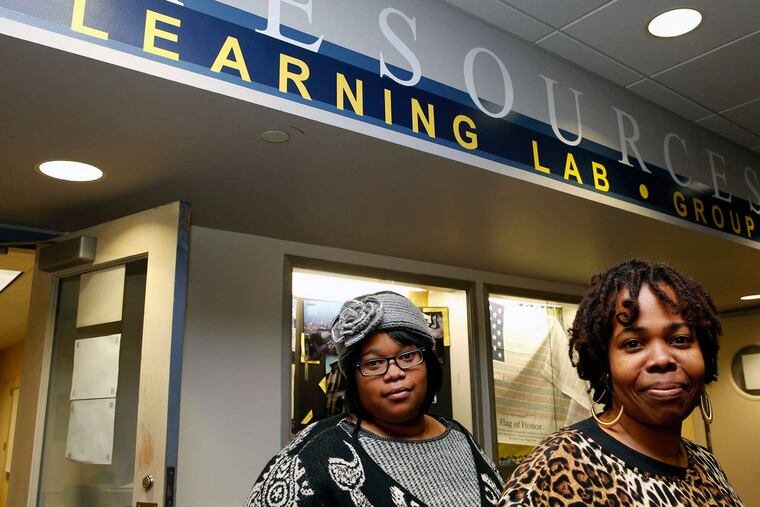Colleges try to solve a $1.5B problem
It's a $1.5 billion annual problem: One in four college freshmen needs at least one remedial course in English, reading, or math.

It's a $1.5 billion annual problem: One in four college freshmen needs at least one remedial course in English, reading, or math.
These "developmental" courses delay students from taking college-level work, often frustrating them as they burn through savings and financial aid for classes that don't count toward their degrees.
"I had students coming in asking me, 'Do you know of any scholarships, because I ran out of financial aid?' and when I looked at their transcripts, they had four or five developmental classes," said Linda A. Hurlburt, vice president for academic services at Rowan College at Gloucester County.
Students also rack up debt, borrowing more than $380 million annually to cover developmental courses, according to a new report from the liberal think tank Education Reform Now, based in Washington.
And remedial work delays or even derails degree completion. Less than a quarter of students at two-year schools who enroll in a remedial course finish their degree within eight years, according to Columbia University's Community College Research Center.
As Philadelphia-area colleges try to retain students, get them to graduation, and minimize student debt, the schools are rethinking developmental education - in some cases doing away with it altogether.
At community colleges, around 60 percent of students take at least one remedial course. Some schools, including those serving Bucks, Montgomery, Delaware, Chester, Philadelphia, and Gloucester Counties, are trying versions of a new philosophy: Students who are close to ready for college courses are placed in those courses anyway, but given additional support such as tutoring.
"Students who were in the gray area, borderline, traditionally they would have gone into a developmental class. And what we did was put them directly into English 101," said Diane McDonald, an English professor at Montgomery County College.
The "gray area" students did nearly as well as students who were placed directly into college English, and the number of students taking developmental English plummeted from 46 percent of students in 2009 to just 6 percent this past fall.
"We just weren't giving them enough credit of rising to the challenge," McDonald said.
Bucks County Community College is also hoping to introduce the "corequisite" idea - instead of a prerequisite model requiring remedial work first - within the next year. The school will offer composition courses with the usual three hours of instruction, followed by an additional hour of instruction, tutoring, or practice work.
"The national data is there to say that it works, so that's not an issue," said Clayton Railey III, the Bucks provost. "It's just an issue of getting people comfortable with doing it this way."
Camden County College is among schools "in the investigation phase" of the idea, and Rowan College at Burlington County is considering it as part of a multipronged approach that includes summer programs, accelerated remedial courses, and high school programs.
Mellitta Berry, 27, of Fern Rock, took two tries to pass developmental math at Community College of Philadelphia.
"It was like I had to practice math every day to remember it," Berry said.
Extra support - some of it from her mother, also a CCP student - made the difference when she repeated the class.
"When there were things that I didn't know, she would know," Berry said. Other times, as with fractions, Berry helped her mom. "I feel like we're both pretty much not good at math at all, but we were both kind of able to help each other during that course."
Then mother and daughter became frequent users of the school's tutoring center, which also aided them with English papers and statistics problems.
"They pretty much know us," Berry said, laughing.
Both women are scheduled to graduate next month.
Changing the philosophy of developmental education will also require a change in how students are initially evaluated, said CCP President Donald Generals. The traditional method of scoring a test and deciding, yes or no, whether the student is ready for a college-level course is outdated, he said.
"It's a production model that has outlived its usefulness, and I think it's doing more harm than good," he said.
Among the evaluation problems is a focus on the wrong topics, said Davis Jenkins, a senior research associate at the Community College Research Center. Why focus on algebra and not statistics, he asked, since many students will be more likely to use statistics than algebra after college?
"What we should really say is: What does it take to succeed in college, and what are the academic and nonacademic skills?" he said. "If we really cared, we would say in these courses how to write a research paper, how to write a lab report, how to study."
That shift in mind-set doesn't affect only community colleges, as many four-year schools also have developmental classes.
Rowan University's president has spoken often of the need to rethink developmental education, promoting the idea of students starting at community colleges before transferring to Rowan for higher-level courses.
Temple University has 5 or 6 percent of students taking developmental math, but developmental English includes English-as-a-second-language students and is sometimes as high as 20 percent of enrollment, said Peter R. Jones, senior vice provost for undergraduate studies.
This year Temple is trying a version of the corequisite model, with tutoring and supplemental class time.
"We're not doing away with developmental prereqs altogether," Jones said, "but we do want to significantly reduce the number of students taking those courses."
Temple also has been upgrading its evaluation process, which would allow the university to provide targeted help.
"As we're doing a better job of identifying what particular math skills or what particular writing skills are problematic," he said, "we're realizing perhaps we don't need the bludgeon of a 14-week course to respond to them."
856-779-3220 @elaijuh